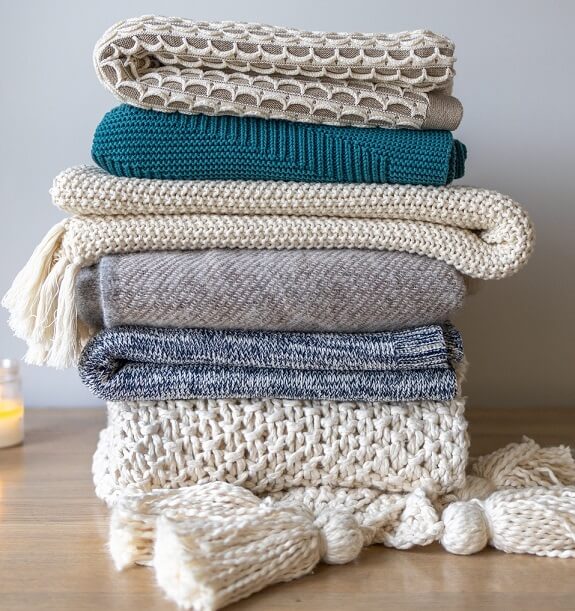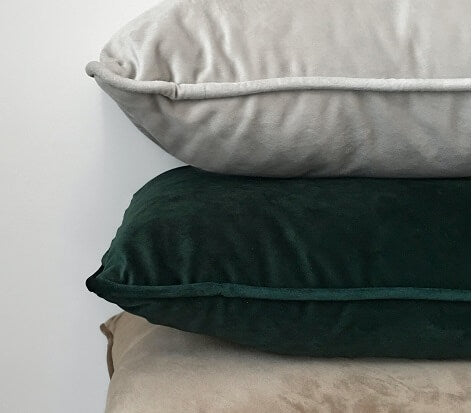In today’s fast-paced world, the importance of quality sleep cannot be understated. For some people, achieving that restful, uninterrupted slumber can prove elusive, and that's where a weighted blanket can be an absolute game changer. But the question often arises - how heavy should your weighted blanket be? To help you sleep like a baby, we’re diving into the nitty-gritty of finding the perfect weight for your blanket.

What is a Weighted Blanket?
Weighted blankets, as the name suggests, are blankets that are heavier than your standard bed coverings. Their distinctive weight comes from materials such as plastic pellets or tiny glass beads that are strategically sewn into compartments throughout the blanket. The magic of these blankets lies in their ability to deliver something known as deep touch pressure or DTP. This phenomenon is akin to receiving a warm, soothing hug. It’s the kind of pressure that can help you relax, ease your anxiety, and transition you into a tranquil slumber. Picture it as a kind of gentle, all-over body massage that happens as you're tucked into bed, helping you drift off into a restful, uninterrupted sleep. Not only do they offer a unique and comforting experience, but they are also becoming increasingly popular among people who suffer from sleep disorders, anxiety, or simply crave a more calming sleep environment.
The Basic Rule for Determining the Weight
As you embark on your quest to find the perfect weighted blanket, the first landmark you'll encounter is the fundamental guideline suggesting that your blanket should weigh around 10% of your own body weight. Imagine you tip the scales at 150 pounds. In that scenario, a 15-pound blanket should be your target. This ten percent rule is deeply rooted in the principles of Deep Touch Pressure (DTP), the very magic that powers the soothing effects of a weighted blanket. Yet, remember, this is a general guideline, not an unbreakable law. Everyone is different, and the perfect blanket weight for you may not fall perfectly within this guideline. It’s vital to keep in mind that your individual comfort and preference take precedence over any rule. After all, sleep is a highly personal experience, and your blanket should cater to your unique needs and comfort level. So, use the 10% rule as a stepping stone in your journey, but don't be afraid to explore and find the perfect weight that feels just right for you.
Individual Preference and Comfort
Just as no two individuals are exactly the same, neither are their sleep needs. The 10% body weight guideline is an excellent starting point when selecting your weighted blanket, but ultimately, your personal comfort is king. If you're someone who sleeps warm, a lighter blanket might be more appealing. On the other hand, if you relish the sensation of a deep, firm hug, a heavier blanket could be your ticket to blissful slumber. It's essential to find that sweet spot where therapeutic weight meets optimal comfort. Remember, a weighted blanket is more than just a sleep aid – it's a personal comfort companion. And just like any good companion, it should complement and cater to your unique needs and preferences. Take the time to explore different weights, touch and feel the blanket, and most importantly, listen to your body. What feels soothing, reassuring, and cozy to you might not strictly adhere to the 10% rule – and that's perfectly okay. In the end, it's about finding that perfect weighted blanket that feels like it was crafted just for you. So, don’t just settle for the general guideline. Embrace the process and find the weight that makes your sleep experience truly restful and serene.
The Impact of Physical Conditions
Your health condition is a crucial factor in the quest for the perfect weighted blanket. Individuals dealing with respiratory or circulatory issues may find a lighter blanket more suitable as it won't exert too much pressure. On the other hand, a heavier blanket could be a solace for those wrestling with restless leg syndrome, providing the right kind of pressure to soothe those jittery limbs. However, navigating through these decisions should not be a solo endeavor. If you're managing health concerns, it's pivotal to rope in a healthcare professional's guidance before zeroing in on a blanket weight. They can help you make a safe and beneficial decision, aligning the soothing potential of a weighted blanket with your health considerations. After all, the goal is to enhance your comfort and sleep quality without compromising your health. Thus, the weight of your blanket shouldn't just feel right—it should also be right for your overall well-being. Remember, your weighted blanket is more than a tool for better sleep—it's an investment in your health. As such, it's vital to make informed decisions, considering every aspect of your physical condition.

Age and Weight Considerations for Children
Weighted blankets can also provide a comforting cocoon for children, especially those grappling with anxiety or sensory processing disorders. However, it's essential to tread carefully when it comes to the weight of the blanket. As a general rule of thumb, the blanket's weight should be roughly 10% of the child's body weight, plus an additional pound or two for added comfort. This ensures the blanket provides the soothing pressure they need without becoming too heavy or restrictive. It's crucial for children to be able to move the blanket easily without feeling overwhelmed. Safety is paramount when it comes to our little ones, so a weighted blanket should never be used with a child under two years old, as it could pose a risk of suffocation. So, while weighted blankets can be a welcome tool in your child's bedtime routine, choosing the right weight with safety and comfort in mind is paramount.
Choosing the Right Weighted Blanket for Couples
Sharing a weighted blanket can be a comforting experience for couples, but finding the right weight can present a unique challenge. It's important to strike a balance that accommodates both partners without compromising on comfort. The general guideline is to select a blanket based on the lighter partner's weight, then adjust for comfort. This allows the heavier partner to still enjoy the soothing benefits of the blanket without it being too overwhelming for the lighter partner.
However, every couple is different, and what works for one might not work for another. For some, the answer lies in individual weighted blankets, allowing each person to choose a weight that suits their personal comfort and preferences. This option offers flexibility and ensures that both partners experience the maximum benefits of a weighted blanket.
Choosing the perfect weighted blanket as a couple requires open communication and a willingness to experiment. Try different weights, discuss your comfort levels, and remember, there's no one-size-fits-all solution. At the end of the day, it's about enhancing your sleep quality and forging a deeper connection through shared comfort. So, whether you decide on a shared blanket or two individual ones, the key is to find the solution that works best for your unique needs as a couple.
Considering the Quality and Durability of the Blanket
In your quest for the perfect weighted blanket, weight is undeniably a significant factor, but it's not the only one. The quality and durability of your blanket are also pivotal elements that deserve careful consideration. After all, you're investing in your comfort and sleep quality, and you want a product that can stand the test of time. Seek out a blanket with robust stitching, as it's essential for evenly distributing and securing the weighted filling. This ensures the pressure remains constant throughout the blanket, enhancing its soothing effects and longevity. Also, a removable cover that is machine washable is a huge bonus. It not only protects your blanket but also simplifies the maintenance process, keeping your blanket fresh and clean for longer. By focusing on these attributes, you'll not only secure a blanket with the right weight, but you'll also ensure it's built to last and easy to care for. Remember, your weighted blanket is not just a sleep aid, it's an investment in your well-being. Therefore, it should be able to stand up to frequent use while providing the utmost comfort and relaxation. So, don't just weigh it, scrutinize its quality and durability, because a good night's sleep is worth the effort.
FAQ
How heavy should my weighted blanket be in kg?
The recommended weight for adults ranges from 5 kg to 15 kg, while the recommended weight for children range from 2 kg to 3 kg. We do not recommend weighted blankets for toddlers, or children under the age of 4. You can also use our quiz to get a customized weight recommendation.
How to figure out correct weight for a weighted blanket?
As we mentioned previously, the ideal weighted blanket weight is roughly 10% of your body weight. Most weighted blankets come in a variety of sizes and weights to accommodate a range of body weights. If you're not sure what works best for you, we recommend rounding down and opting for the lighter weighted blanket.
Do weighted blankets help with sleep?
The researchers noted that while using a weighted blanket, the participants in their studies were able to fall asleep more easily, woke less frequently during the night and felt an increased sense of calm during the day
What to read next

Cozy Comfort: How Chunky Blankets Can Help Tackle Sleep Disorders

Decoding Size: How Big Are Body Pillows Really?

Unlocking Productivity: Harnessing the Power of White Noise for Enhanced Focus and Concentration
What to shop
 Iniko Weighted Blanket
Iniko Weighted Blanket
From $157.95
Snug Blackets in Pink, White, Gray and Coffee Brown
From $78.00
 Winter Imitation Fur Plush Blanket
Winter Imitation Fur Plush Blanket
From $68.95







